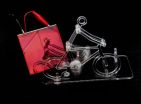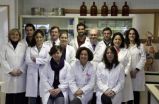(Press-News.org) Most nurses in their work care for patients who are dying. A study of more than 200 students has shown that many nurses in training feel unprepared and anxious when faced with the prospect of meeting patients during end-of-life care.
Scientists from the Sahlgrenska Academy have interviewed 222 nursing students at the University of Gothenburg, the University of Skövde and the Ersta Sköndal University College. The interviews dealt with their thoughts about caring for dying patients, their ideas about how to support and meet the patient in dialogue, and their own feelings when faced with dying patients.
Beyond understanding
The interviews showed that even though many students view death as a natural part of life, many find the idea of death to be frightening, and beyond understanding.
"Death awakens feelings of helplessness, insecurity and insufficiency in most nursing students. Some find it natural to talk about death, while others consider it to be the worst thing that can happen and have difficulty coping with the need to talk about it," says Susann Strang, scientist at the Sahlgrenska Academy.
A Nurse´s Responsibility
Many students described how they did not know how to answer the patients' questions, and desired to change the subject when patients brought death up. At the same time, a large fraction of the students consider it to be the responsibility of nurses to appear strong in front of patients.
"Our study shows that the students have an ideal of a competent nurse and perfect care that differs significantly from the actual situation. The issues of death and dying have much to do with the students' own fear and lack of experience, while at the same time they place high demands on themselves to be good caregivers," says Susann Strang.
"Many hope that this will become easier with time, and that one day they will have the courage required to care for dying patients and dare to engage with them. Nurse education can play a more active role here by discovering at an early stage which students experience strong anxiety about meeting and caring for dying patients, and offering these students guidance, training and support."
The article Swedish nursing students' reasoning about emotionally demanding issues in caring for dying patients will be published in the
International Journal of Palliative Nursing
Voices from the Students
"I'm frightened about it, and I was terribly upset during my work placement whenever a patient died. The whole situation can be frightening, and the dead body..."
"A nurse is expected to be strong. It may very well be tragic to see a person who I have cared for dying in front of my eyes. It may affect me emotionally. But I am to support the family of the dying person. So I have to be strong."
"Well, I think it's really awful to deal with the cold body. I can manage to sit there and wait, and be present as long as the patient is breathing, but once he or she is dead I find it extremely upsetting."
"Of course it's difficult, but as a caregiver and fellow human being I regard it as my duty not be afraid or uncomfortable when faced with difficult situations. I regard it as a benefit to be able to hear another person's thoughts about something so great that affects me not only professionally but also personally."
"I'm not uncomfortable when it comes to spending time with people who are dying. But I do feel unsure about how to talk to them, the questions they pose. I don't have very much experience of giving existential counselling to people who are dying."
"For me, death is the worst thing that can happen, but it is at the same time a part of life, so we have to be able to talk about it".
INFORMATION:
Contact
Susann Strang
Associate Professor at the Sahlgrenska Academy
University of Gothenburg
+46 31 786 6039
susann.strang@gu.se
Website: http://www.caresci.gu.se
Many nurses unprepared to meet dying patients
2014-09-02
ELSE PRESS RELEASES FROM THIS DATE:
Risk of diabetes in children and adolescents exposed to antipsychotics
2014-09-02
Washington D.C., September 2, 2014 – A study published in the September 2014 issue of the Journal of the American Academy of Child and Adolescent Psychiatry found that children and adolescents diagnosed with a psychiatric diagnosis had an increased risk of developing diabetes if they were exposed to antipsychotics.
Using data from the nationwide Danish registers, a group of researchers led by Dr. René Ernst Nielsen, Psychiatry, Aalborg University Hospital, Denmark, studied 48,299children and adolescents with psychiatric disorders to document the frequency and possible ...
The Disappearing Spoon author Sam Kean takes on the megalodon myth
2014-09-02
WASHINGTON, September 2, 2014 — Best-selling author Sam Kean stops by Reactions this week to debunk the myth of the Megalodon, the 50-foot super shark that, despite what "Shark Week" may lead you to believe, is long extinct. Learn all about it at http://youtu.be/KhFygIoW_MA.
Kean's book, "The Disappearing Spoon: And Other True Tales of Madness, Love and the History of the World from the Periodic Table of the Elements," is getting the Reactions treatment in a 10-episode video series produced for the newly launched American Association of Chemistry Teachers (AACT). In this ...
Rediscovering our mundane moments brings us unexpected pleasure
2014-09-02
We like to document the exciting and momentous occasions in our lives, but new research suggests there is value in capturing our more mundane, everyday experiences, which can bring us unexpected joy in the future.
"We generally do not think about today's ordinary moments as experiences that are worthy of being rediscovered in the future. However, our studies show that we are often wrong: What is ordinary now actually becomes more extraordinary in the future — and more extraordinary than we might expect," explains psychological scientist and lead researcher Ting Zhang ...
Family conflicts, other non-physical worries before cancer surgery raise patients' complication risk
2014-09-02
ROCHESTER, Minn. — How well patients recover from cancer surgery may be influenced by more than their medical conditions and the operations themselves. Family conflicts and other non-medical problems may raise their risk of surgical complications, a Mayo Clinic study has found. Addressing such quality-of-life issues before an operation may reduce patients' stress, speed their recoveries and save health care dollars, the research suggests. The study specifically looked at colon cancer patients, and found that patients with a poor quality of life were nearly three times likelier ...
Future solar panels
2014-09-02
This news release is available in Spanish.
The solar panels we see tend to be rigid and black. Organic photovoltaic technology, by contrast, enables more translucent and more flexible solar panels in a range of colours to be manufactured. But this technology needs to meet certain requirements if it is to be accepted on the market: greater efficiency, longer duration and low production cost. So this research has set out "to analyse the capacity new materials have to absorb solar energy as well as to seek appropriate strategies to move from the lab to actual operations," ...
Study conducted on rats suggests that hyperproteic diets can be beneficial for bones
2014-09-02
This news release is available in Spanish.
Researchers at the University of Granada have found, through an experiment conducted on rats, that hyperproteic diets could be beneficial for bones, which would be of great use for groups with bone disease problems, such as the elderly or post-menopausic females.
Their research has also revealed that vegetal protein—in the case of the present study, soy protein—is preferable to animal protein (such as whey protein), since the former increased the level of calcium in bones by as much as seven per cent.
In an article published ...
Over-the-counter pain reliever may restore immune function in old age
2014-09-02
New research involving mice suggests that the key to more youthful immune function might already be in your medicine cabinet. In a report published in the Journal of Leukocyte Biology scientists show that macrophages from the lungs of old mice had different responses to Mycobacterium tuberculosis than macrophages from young mice, but these changes were reversed by ibuprofen.
"Inflammation in old age can have significant consequences on immune function," said Joanne Turner, Ph.D., a researcher involved in the work from the Department of Microbial Infection and Immunity ...
Coffee increases prediabetes risk in susceptible young adults
2014-09-02
Barcelona, Spain – Tuesday 2 September 2014: Coffee increases the risk of prediabetes in young adults with hypertension who are slow caffeine metabolisers, according to results from the HARVEST study presented at ESC Congress today by Dr Lucio Mos from Italy. People who drank more than three cups of coffee per day doubled their risk of prediabetes.
Dr Mos said: "Lifestyle factors are very important for the prognosis of young people with hypertension. In a previous analysis of HARVEST (Hypertension and Ambulatory Recording VEnetia STudy) we found that coffee was a risk ...
The Lancet: European Society of Cardiology Congress 2014 media alert
2014-09-02
The Lancet is pleased to announce that the following papers will be published to coincide with presentation at the ESC Congress 2014, taking place in Barcelona, Spain, 30 August – 3 September 2014:
Ultrathin strut biodegradable polymer sirolimus-eluting stent versus durable polymer everolimus-eluting stent for percutaneous coronary revascularisation (BIOSCIENCE): a randomised, single-blind, non-inferiority trial, Windecker et al
Refinements in stent design affecting strut thickness, surface polymer, and drug release have improved clinical outcomes of drug-eluting stents. ...
War between bacteria and phages benefits humans
2014-09-02
BOSTON (September 2, 2014) — In the battle between our immune systems and cholera bacteria, humans may have an unknown ally in bacteria-killing viruses known as phages. In a new study, researchers from Tufts University, Massachusetts General Hospital, Partners In Health, Haiti's National Public Health Laboratory, and elsewhere, report that phages can force cholera bacteria to give up their virulence in order to survive. Importantly, the study — published in eLife — found that cholera's mutational escape from phage predation occurs during human infection.
First author ...





